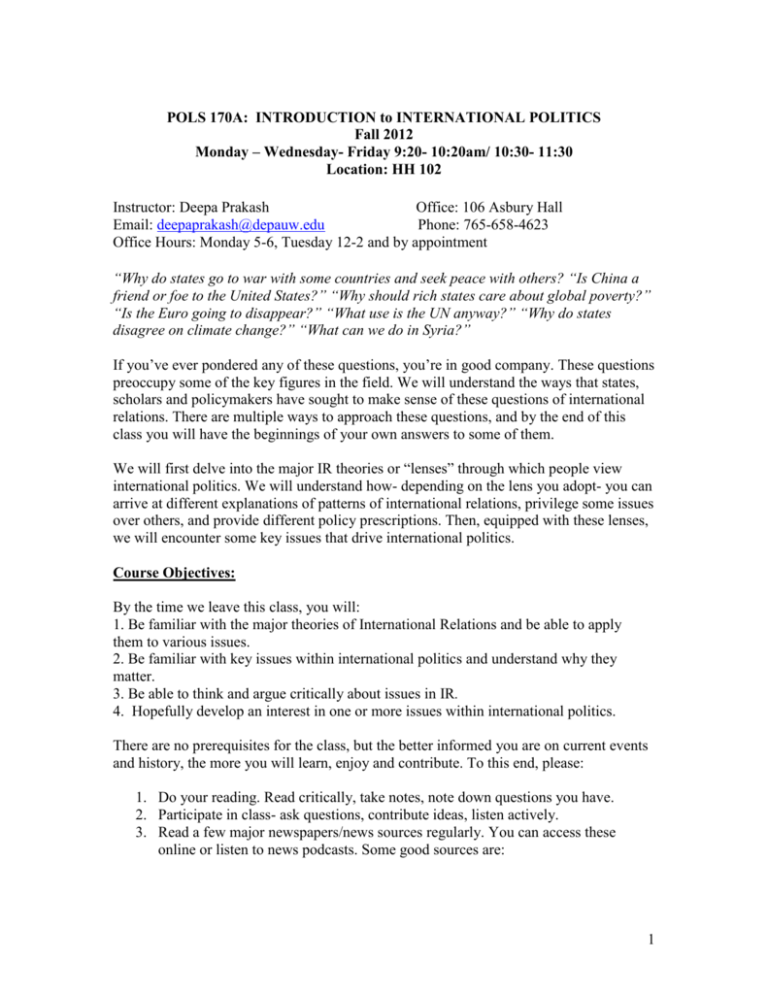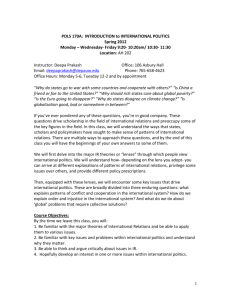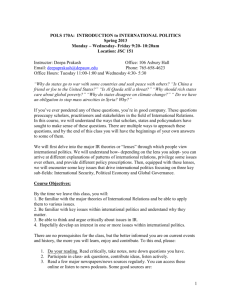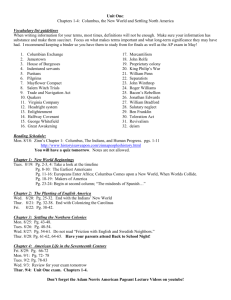Pols 170A&B International Politics (Prakash)
advertisement

POLS 170A: INTRODUCTION to INTERNATIONAL POLITICS Fall 2012 Monday – Wednesday- Friday 9:20- 10:20am/ 10:30- 11:30 Location: HH 102 Instructor: Deepa Prakash Office: 106 Asbury Hall Email: deepaprakash@depauw.edu Phone: 765-658-4623 Office Hours: Monday 5-6, Tuesday 12-2 and by appointment “Why do states go to war with some countries and seek peace with others? “Is China a friend or foe to the United States?” “Why should rich states care about global poverty?” “Is the Euro going to disappear?” “What use is the UN anyway?” “Why do states disagree on climate change?” “What can we do in Syria?” If you’ve ever pondered any of these questions, you’re in good company. These questions preoccupy some of the key figures in the field. We will understand the ways that states, scholars and policymakers have sought to make sense of these questions of international relations. There are multiple ways to approach these questions, and by the end of this class you will have the beginnings of your own answers to some of them. We will first delve into the major IR theories or “lenses” through which people view international politics. We will understand how- depending on the lens you adopt- you can arrive at different explanations of patterns of international relations, privilege some issues over others, and provide different policy prescriptions. Then, equipped with these lenses, we will encounter some key issues that drive international politics. Course Objectives: By the time we leave this class, you will: 1. Be familiar with the major theories of International Relations and be able to apply them to various issues. 2. Be familiar with key issues within international politics and understand why they matter. 3. Be able to think and argue critically about issues in IR. 4. Hopefully develop an interest in one or more issues within international politics. There are no prerequisites for the class, but the better informed you are on current events and history, the more you will learn, enjoy and contribute. To this end, please: 1. Do your reading. Read critically, take notes, note down questions you have. 2. Participate in class- ask questions, contribute ideas, listen actively. 3. Read a few major newspapers/news sources regularly. You can access these online or listen to news podcasts. Some good sources are: 1 Major World Newspapers: The New York Times, Washington Post, The Guardian, Wall Street Journal, The Financial Times Websites: http://www.foreignpolicy.com/ BBC http://www.bbc.co.uk/news/world/, Al Jazeera http://english.aljazeera.net/ Magazines: The Economist http://www.economist.com/ Blogs: Stephen Walt on ForeignPolicy.com http://walt.foreignpolicy.com/ , Daniel Drezner http://drezner.foreignpolicy.com/ Course Materials: There are two required texts for this class: The first is the main textbook, referred to as D’Anieri in the syllabus: 1. Paul D’Anieri International Politics: Power and Purpose in Global Affairs Side by side, we’ll be exploring the world of the undead with: 2. Daniel Drezner (2010) Theories of International Politics and Zombies Princeton Univ. Press. I will supplement these texts with articles and other materials on moodle, marked with (E) for electronic. For any given week, reading all the assigned material is essential. 3. A few classes assign podcasts from This American Life (TAL). In each case I have provided (and will update if needed) the episode page on the TAL website’s archive- you can stream the episode from there, read the transcript or download from itunes. Listening to the podcasts should be treated like a reading assignment. Course Requirements The Grading system and scale is as follows: Grade A Points 940+ A900939 A = 94 -100 % A- = 90- 93.9 % B+ = 87- 89.9 % B = 83- 86.9%, B+ 870899 B 830869 B800829 B- = 80- 82.9 % C+ = 77- 79.9 % C = 73- 76.9 % C- = 70- 72.9 C+ 770799 C 730769 C700729 D 620699 F 620 and below D = 62- 69.9 % F= below 62 % Your grade is made up of the following components: 2 Quizzes 10% (100 points) There will be 6 random pop quizzes, in class writing assignments or map tests during the course of the class. If you are keeping up with the reading and paying attention in class, you’ll do fine. I will drop your lowest grade at the end. There will be no make up quizzes. Participation 15% (150 points) This class will only work if all of us contribute to it. If we contribute thoughtfully it will be a roaring success. Thus participation counts for a large portion of your grade. Participation doesn’t just refer to showing up and sitting passively in class. By participation, I refer to active, well-prepared and respectful contributions. So please come to class: a) having done the assigned reading b) contribute in a thoughtful manner – ie. with reference to examples, current news events or the readings c) ask and answer questions and d) importantly, engage with the perspectives being offered in class. IR discussions can get pretty heated but it’s part of our education to learn from different perspectives and engage them thoughtfully. Try to come to class with at least one question or comment per day. I may call on you to stimulate discussion. If you’re shy, there are ways to participate effectively. Eg.Contribute your thoughts on the class forum on moodle. Email me with comments or questions. Suggest an interesting story or article that fits with the class. Remember that it helps to write down your thoughts so you have something to refer to in class. In short, there are many ways to participate and contribute to class. You will get a lot more out of the class if you choose some of these ways. 2 Short Papers - 25% total (12% and 13% respectively) (250 points) You will write two short papers during the semester. In each case, you will be asked to interpret and analyze articles, speeches or a film based on the theories we have learned. Each paper should be 4-5 pages, typed, numbered, double-spaced and stapled- please no loose leafs of paper! You will all do paper 1 but after that you have the choice of doing either paper 2 (on security) or paper 3 (on economic globalization). If you do paper 2, you cannot then also do 3 for a higher grade. So choose wisely! The assigned article and guidelines will be announced and distributed in class. 3 Journal 10% (100 points) International Relations thrives on a synthesis between theory and real world events and you are encouraged to make these connections throughout the course. You will write a journal connecting events in the world to what we’re doing in class. To get the full 10% you should have written 10 journal entries from Week 3- 13. Every week you will pick one story in the news that relates to what we’re reading and discussing in class that week. You will be expected to briefly provide the details of the news story (where it’s from, who wrote it, dates, title etc.), connect it to class materials, note why it is interesting and what you think of it in about 300-400 words. Every 2 weeks you will submit your entry electronically to me. Journals will be due in my inbox by Thursday, 5 p.m. I may call on you to share a story you picked that week. If picked, be prepared to briefly explain why you picked the story, how it fits with the theory or issue we’re discussing and what your thoughts or questions on the story are. You are highly encouraged to post your story on the moodle forum. You won’t be graded on the content of the journal but you will be required to complete all entries in a relevant and thoughtful manner. If you write a relevant entry every week and submit it on time, you will get the full 10%. 2 Exams (40% total, 400 points) 1 Midterm (18%) and a Final (22%) There will be two exams along the way – a mid-term and a final. Exams will be closed book. The mid-term will test you on material from week 2-7 and the final will test on week 8-13, plus the major theories. They will consist of a mix of multiple choice questions, matching, short answers and essays. NOTE: THE EXAM DATES ARE NON-NEGOTIABLE AND NON-CHANGEABLE. PLEASE MAKE TRAVEL PLANS ACCORDINGLY. CLASS POLICIES1 Attendance Policy: Too many unexcused absences will affect your course grade. If you have 3-5 unexcused absences – your grade will be lowered a half letter (so a B will become a B-); 6-8 absences - grade will be lowered a full letter (so a B will become a C); 8 or more absences - subject to my discretion, you may get an F. 1 Please read more carefully than an itunes software agreement! 4 Late Policy: Please come to class on time. If you are consistently late, it will affect your participation grade. If you have some constraints (ie. Class on the other side of the campus) let me know before time. Also once in class, please stay in class and don’t saunter in and out- unless you absolutely need to. Late turning work in: Your work is due when it’s due. Except for extenuating circumstances there will be no extensions – I’ll be the judge of those circumstances. For every day past the deadline, I will deduct half a letter grade from your paper. Beyond 3 days, I will not accept the assignment. Come and talk to me with any issues early on. Academic Integrity Policy: DePauw University and I both take academic integrity very seriously and I will uphold DePauw University’s Academic Honesty Policy. Cheating, plagiarism, submission of the work of others, etc. violates DePauw policy on academic integrity and will result in penalties ranging from an F for the assignment or F for the class to academic probation or even suspension from the university, depending on the circumstances. The policy and discussion of each student’s obligations and rights are in the Student Handbook. The complete Academic Integrity Policy can be found at: http://www.depauw.edu/univ/handbooks/dpuhandbooks.asp?ID=101&parentid=100 Ignorance of the rules is not a valid excuse so make sure you’re familiar with University policy. There is absolutely no reason to consider cheating or passing someone else’s work off as your own. If you have any doubt whatsoever that you may be incorrectly using someone’s work- please feel free to check with me and ask. Remember, an honest C- is much better than a risky B, so don’t do it. To avoid the problem of plagiarism be sure to attribute all information, data, arguments, and language – even if paraphrased – borrowed from sources to the original author and to document the source fully. · Attribution = “According to XYZ…” · Documentation = source citation in foot- or end-note form or using parenthetic citation: (XYZ, 92). Parenthetic citation requires a “Works Cited/References” list at the end of the paper. ADA/Disability Accommodations: If you have a learning disability or other special needs, please let the Coordinator of Student Disabilities Services, Pamela Roberts, 765658-6267, Harrison Hall 302 know as soon as possible. I rely on the Disability Services Coordinator for assistance in verifying the need for accommodations and developing an accommodation strategy so please make an appointment to see me after you have received your letter. I will not be able to make accommodations without the advice of Disability Services. 5 Technology Policy: Very few things are as distracting as a ringing/buzzing cell phone. Please turn yours off or on silent – not just vibrate. This also means no TEXTING. Do us all a favor and keep your phone in your bag, please! I discourage the use of laptops in the class- if you absolutely need one for the sole purpose of taking notes, talk to me beforehand. Communication with Me: My office hours exist for you to come by for a chat, to discuss the material, follow up on questions and seek advice or help. So, please don’t hesitate to drop by my office- I’d much rather talk with you than stare at my computer screen! If your schedule does not accommodate the scheduled office hours, please make an appointment. Of course, make sure emails are comprehensible and are addressed appropriately and not too ‘creatively’. Note: Your official DePauw email is the one we will use to minimize confusion. Phew! Ok, now let’s see what this class is all about, shall we? COURSE SCHEDULE (This schedule may be modified, within reason, as the semester progresses) WEEK 1: INTERNATIONAL POLITICS: THE WHO, WHEN AND WHAT Wed Aug 22 What is IR? Introductions, Reading the Syllabus Fri Aug 24 WHY LEARN THEORY D’Anieri, Chapter 1 p 4-10, 14- 18 (end of Normative Theory) Drezner “Introduction”, “Defining a Zombie” p. 1-22, 31-32 WEEK 2: Systemic Approaches: REALISM Mon Aug 27 Concepts and History D’Anieri p. p. 18 (bottom)- 19, 26-30, 44(bottom)-52 Krasner ‘Sovereignty’ Foreign Policy Wed Aug 29: Structural Realism D’Anieri Realist Theories p. 58-69 (top) Drezner “The Real Politik of the Living Dead” p. 33- 45 Fri Aug 31 Realism Continued 6 D’Anieri p. 69-73 Mearsheimer, J. (2006) “China’s Unpeaceful Rise” Current History Walt, Stephen China’s New Strategy http://walt.foreignpolicy.com/posts/2010/04/25/chinas_new_strategy WEEK 3: IT’S BEEN REAL: LIBERALISM Mon Sept 3 In class Exercise PD Simulation (The Situation will be distributed before time) Wed Sept 5 PD debrief D’Anieri Liberalism p. 74-83 Fri Sept 7 Drezner “Regulating the Undead in a Liberal World Order” p. 47- 60 Brezinski and Mearsheimer Clash of the Titans (E) Ikenberry, “China’s Rise” p. 28-37 WEEK 4: CONSTRUCTIVISM Mon Sept 10 D’Anieri Constructivism p. 94-101 Listen: This American Life “Kid Politics” Stories 1 and 2 http://www.thisamericanlife.org/radio-archives/episode/424/kid-politics Wed Sept 12 Drezner The Social Construction of Zombies p. 67- 76 Piers Brendon China also Rises The National Interest October, 2010 (E) Fri Sept 14 Applying the theories D’Anieri Comparing the paradigms p. 109-114 Paper 1 Assigned WEEK 5: MORE SOCIAL THEORIES Mon Sept 17: Feminism D’ Anieri Gender theories p. 101- 109 (top) Cynthia Enloe Beaches, Bananas and Bases (Excerpt) Introduction (E) p. 1-7, skim portions about Iran Contra 7 Recommended: Carol Cohn, Sex and Death in the Rational World of Defense Intellectuals Wed Sept 19 Domestic Politics D’ Anieri p. 151-152, 155-166 Drezner Domestic Politics and Bureaucratic Politics p.77-97 Fri Sept 21: Individual Level Explanations D’Anieri 166- 175 Drezner We’re only Human p. 99- 107 WEEK 6: INTERNATIONAL SECURITY Mon Sept 24th Causes of War D’Aneiri International Conflict 180- 195 Case: D’Anieri p. 119-127 Wed Sept 26th Military Force Inter-state War and WMD’s D’ Anieri p. 208- 218, (skip types of WMD) and then p. 219-224 (read up till section on terrorism) Fri Sept 28th: Technology and War Michael Hastings (2012) The Rise of the Killer Drones Rolling Stone Explore Singer’s website on the coming face of war: http://wiredforwar.pwsinger.com/index.php?option=com_content&view=article& id=61&Itemid=54 He calls himself a ‘war nerd’ and specializes in the revolution in military affairs. Paper 1 Due WEEK 7: NON-TRADITIONAL SECURITY Mon, Oct 1: Terrorism Come to class with your own definition of Terrorism D’ Anieri p. 222- 236 (start from insurgency onwards) The Jihadist Next Door New York Times Recommended: “The Convert” This American Life Wed Oct 3: Counter-Terrorism 8 John Mueller “Six Rather Unusual Propositions about Terrorism” Terrorism and Political Violence 2005 (E) Fri Oct 5: Human Security Lloyd Axworthy (2001) Human Security and Global Governance: Putting people first Global Governance 19-22 (E) Carpenter, Charli http://duckofminerva.blogspot.com/2010/01/top-10-emerginghuman-security-issues.html Paper 2(a) Assigned WEEK 8: Mon Oct 8: Mid-Term Wed Oct 10: Samuel Huntington “The Clash of Civilizations” Foreign Affairs (E) Skim entire article but read particularly p. 1-6, 18-20, 27- 28 Edward Said “The clash of Ignorance” The Nation Fri Oct 12: Immigration Fall Break Enjoy!! WEEK 9: INTERNATIONAL POLITICAL ECONOMY Mon October 22 D’Anieri Economic Structuralism p. 89- 94 top D’Anieri The Importance of Political Economy p. 242- 254, 263-265 Wed October 24 Trade D’Anieri 271- 282 Explore: http://www.wto.org/ Come to class with notes on what the WTO is, what is its mission, what issues does it cover. Fri October 26 D’Anieri Finance and Business p. 282- 291 top Listen: This American Life ‘Where does money come from” Stories 1,2 and 3 http://www.thisamericanlife.org/radio-archives/episode/423/the-invention-ofmoney 9 WEEK 10: ISSUES: FINANCE Mon October 29 Financial Crises D’Anieri p. 291-294 Listen (entire episode): This American Life The Giant Pool of Money http://www.thisamericanlife.org/radio-archives/episode/355/the-giant-pool-ofmoney Paper 2A Due Wed October 31 Economic Globalization D’Anieri Globalization p. 294- 297 Zakaria, Fareed The rise of the rest Friedman, T. The World is Flat Fri Nov 2 Inequality and Development D’anieri Inequality p 302- 312 Look up Millennium Goals http://www.un.org/millenniumgoals/ Paper 2b Assigned WEEK 11: INTERNATIONAL ORDER Mon Nov 5: Development D’Anieri Strategies for Development Today p. 312- 326 Wed Nov 7 International Organizations D’Anieri The United Nations p. 334- 346 Tharoor, S. UN reform Think Again: The UN Security Council September 23, 2009 Foreign Policy (E) Fri Nov 9: UN Reform continued and European Union D’Anieri p. 346- 354 TAL Continental Breakup (listen to all acts) http://www.thisamericanlife.org/radioarchives/episode/455/continental-breakup WEEK 12: International Order: Law and Human Rights Mon Nov 12 Powers, Samantha Bystanders to Genocide 10 Explore: the R2P Website http://www.responsibilitytoprotect.org/ Wed Nov 14 International Law D’Anieri p. 366-380 Posner, E. “Think Again: International Law” Foreign Policy (E) Fri Nov 16 D’Anieri p. 381- 388 Tharoor, S. “Are Human Rights Universal?” World Policy Journal 16 (4) 1999/2000 (E) Paper 2b due WEEK 13: Global Issues Mon. Nov 19 Population and Transnational Crimes D’Anieri p. 394- 404 Wed Nov 21 D’Anieri p. 404- 411 Larmer The Big Melt http://ngm.nationalgeographic.com/print/2010/04/tibetanplateau/larmer-text Rothkopf Climate Change and Security Fri Nov 23 Take the Ecological footprint survey athttp://www.myfootprint.org/ (note: you do not have to put in your email address)- come to class with your results Bell and Bechman How much did the Climate Change talks in Durban accomplish? http://www.foreignaffairs.com/articles/136762/ruth-greenspan-belland-barry-blechman/how-much-did-the-climate-talks-in-durban-accomplish WEEK 14: NGO’s, Transnational Actors Mon Nov 26: Anne Marie Slaughter Adapting US Policy in a changing international system http://www.theatlantic.com/international/archive/2011/09/adapting-us-policy-in-achanging-international-system/245307/ 11 Wed Nov. 28: NGOs The Dark Side Bob, Clifford. 2002. “Merchants of Morality.” Foreign Policy March/April: 3645. (E) Friday Nov 30 NGO Activity WEEK 15: Concluding Thoughts Monday Dec 3 D’Anieri p. 426 Come to class with your own big questions about the shifting world order. Wednesday Dec 5 Recommended: Stephen Walt “Top ten books every student of IR should read” http://walt.foreignpolicy.com/posts/2009/04/09/my_top_ten_books_every_student _of_international_relations_should_read FINAL (ON MATERIAL FROM WEEK 1- 14) 12







